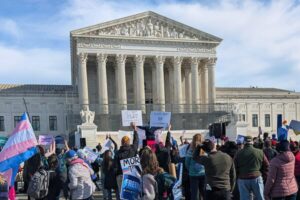
Finding Your People
I fall down YouTube rabbit holes sometimes as a way of unwinding. Lately, the algorithm has been sending me videos of teenagers covering rock songs from the ’70s and early ’80s, and some of them are better than they have any right to be. I’ve been particularly struck by how many of these bands choose to do covers of Rush songs.
Rush was big when I was in junior high and early high school. It was a “progressive rock” band, which means it was either ambitious or pretentious, depending on your preference. I found it insufferable at the time. My brushes with it were usually on the school bus, with the ‘burnouts’ in the back blasting “Tom Sawyer” as often as they could, including on cold winter mornings. No, thanks.
Hearing the songs covered decades later, though, I realized that I was reacting more to the context than to the music. I didn’t like the people who liked Rush, mostly because they didn’t like me. The music was guilty by association. Now, in an entirely different context, it’s mostly tolerable.
I thought of that in reading this uncommonly thoughtful piece by Samuel Bagg. Bagg asks broadly how American society fell into the reality-denying space that it has, which is a well-worn question, but I haven’t been able to stop thinking about his answer. He notes that the usual answer favored by academics is to replace bad information with good information. That approach has an obvious appeal—as Hegel put it, freedom is the insight into necessity—but people are able to tune out information that doesn’t fit their social identities. Instead of looking at credulity as a sign of ignorance or stupidity, neither of which is new or unique to the present, we should look at it as a marker of a social identity. “People like me” believe certain things and not others, studies be damned.
That could easily lead to a sort of fatalism, and Bagg hints at that. But it also suggests revisiting William James’s claim that “the aim of a college education is to teach you to know a good man when you see one.” Nobody can be an expert in everything. Even the brightest, most widely read person will have massive blind spots. In large part, we decide what to believe by deciding whom to trust. James characteristically boiled that down to a single sentence, though I’d replace “man” with “person,” or, better, “people”: I believe the moon landing was real, mostly because I trust the people who do more than the people who don’t.
In Platonic terms, sometimes “right opinion” is the best we can get. With the limited exception of their own expertise, people often align with the views of groups with which they identify. Education can expose other options, but motivated reasoning is powerful. And, in the age of AI, it’s possible to simulate sophistication on nearly any topic without knowing much about it at all.
Historically, what political scientists call “mediating institutions” helped people decide what to believe about issues on which they weren’t experts. Churches, political parties, and labor unions used to have much larger membership than they do now, and they often performed the work of filtering information for their members. (Many daily newspapers started out as organs of political parties, which is why so many local papers have the name “Democrat” or “Republican” in them. The idea of journalistic objectivity came later.) We can see vestiges of that in organizations like the NRA or the AARP, with the important distinction that their focuses are much narrower.
As mass membership organizations declined, information sources fragmented. The mass media monoculture that existed from roughly 1950 to maybe 1990 masked the decline for a while, but the repeal of the Fairness Doctrine in 1987 and the subsequent rise of the internet shattered the media consensus. Now people can find confirmation of their biases with minimal effort. Even worse, the decline of gatekeeping—which absolutely had its own issues—brought with it a decline of fact-checking. Entire information bubbles emerge, self-reinforcing and hermetically sealed from empirical reality. Spend enough time in those, and no amount of peer-reviewed studies will dissuade you from anything.
In this environment, William James’s point is even stronger.
Colleges, and particularly open-admission colleges, expose people to others from different backgrounds and encourage thoughtful interaction. It’s easy to demonize someone from behind a screen, but much harder when they’re right in front of you. (I like the term “keyboard warriors” for that, but don’t know who coined it.) In college, I met people who grew up as evangelical Christians, people who were openly gay and people who had grown up in other countries. I discovered that wealth and virtue are not synonyms. My sense of who “my people” are evolved. I found I had much more in common with some folks whose demographics didn’t resemble mine at all than I did with some who looked like me. And I had some unthought beliefs challenged, which was both painful and deeply necessary.
I got better at recognizing good people when I saw them—not perfect, but better.
To the extent that some people demonize higher education as “liberal” or “leftist,” this is the core of the accusation: Exposure to new people may change whom they trust. That’s independent of classroom instruction, except to the extent that classroom instruction sparks conversation. Exposure to real people, with the time and venue for actual conversation, threatens the hold of self-reinforcing bubbles. It gives people a chance to find their people beyond the confines of family and neighborhood. To true believers within bubbles, that can look like a threat. And, in a way, it is.
Yes, colleges should help students develop ways to make a living. But they should also help students decide for themselves what kind of lives they want to lead. The best way to do that is through exposure and interaction. Maybe some students will go on to find new ways to build mediating institutions, and maybe they won’t. But I’d much rather risk failure in that than surrender to the algorithm. Rehabilitating Rush is one thing; rehabilitating racism is something else. The words “college” and “colleague” share a root; they’re both about bringing people together. I can’t think of a more necessary mission for 2025.
Source link



